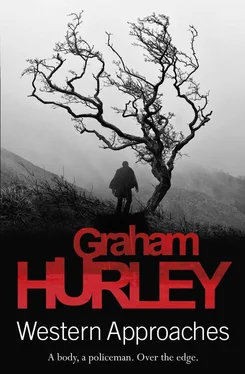Graham Hurley - Western Approaches
Здесь есть возможность читать онлайн «Graham Hurley - Western Approaches» весь текст электронной книги совершенно бесплатно (целиком полную версию без сокращений). В некоторых случаях можно слушать аудио, скачать через торрент в формате fb2 и присутствует краткое содержание. Год выпуска: 2012, ISBN: 2012, Издательство: Orion, Жанр: Полицейский детектив, на английском языке. Описание произведения, (предисловие) а так же отзывы посетителей доступны на портале библиотеки ЛибКат.
- Название:Western Approaches
- Автор:
- Издательство:Orion
- Жанр:
- Год:2012
- ISBN:9781409131540
- Рейтинг книги:4 / 5. Голосов: 1
-
Избранное:Добавить в избранное
- Отзывы:
-
Ваша оценка:
- 80
- 1
- 2
- 3
- 4
- 5
Western Approaches: краткое содержание, описание и аннотация
Предлагаем к чтению аннотацию, описание, краткое содержание или предисловие (зависит от того, что написал сам автор книги «Western Approaches»). Если вы не нашли необходимую информацию о книге — напишите в комментариях, мы постараемся отыскать её.
Western Approaches — читать онлайн бесплатно полную книгу (весь текст) целиком
Ниже представлен текст книги, разбитый по страницам. Система сохранения места последней прочитанной страницы, позволяет с удобством читать онлайн бесплатно книгу «Western Approaches», без необходимости каждый раз заново искать на чём Вы остановились. Поставьте закладку, и сможете в любой момент перейти на страницу, на которой закончили чтение.
Интервал:
Закладка:
At the time Lizzie had dismissed the story as a figment of Mrs Peacock’s imagination. This kind of legend was the currency of village life and Mrs P was obviously a big spender. Lately, though, as the damp walls of Chantry Cottage pressed closer and closer, Lizzie had begun to think more about the story. Anything to revive the numbness that used to be my brain, she’d thought. Anything to stop me becoming a complete vegetable.
Now, aware of Lizzie’s hesitation, Mrs Peacock was beckoning her into the church. She had a long, slightly horsey face and wisps of white hair curling from her chin. Come in, she seemed to be saying. We won’t bite.
Lizzie found a perch on the end of an empty pew. Grace, mercifully, seemed to have gone to sleep. At the altar a line of elderly worshippers waited to take communion. They were all women and most of them used walking sticks. Watching them as they shuffled painfully towards the altar rail, Lizzie found herself wondering what had happened to their menfolk. Were their husbands at home, sorting out the midday roast, or had the retirement years in Colaton Raleigh finally throttled the life out of them?
She had no way of knowing, of course, and as Mrs Peacock threw her another smile and struggled to her feet to join the communicants, Lizzie remembered the morning she’d taken up the carpet in the sitting room. Back then, in December, she’d still had the energy and the self-belief to pit herself against the challenges of Jimmy’s little find. Chantry Cottage, she’d told herself, was simply bricks and mortar. She could make a difference; she could roll her sleeves up and have a proper sort-out.
The previous occupant, according to Jimmy, had been a lifelong hippy who’d read a couple of books about some Indian guru and become a yoga teacher. Living on virtually nothing, she’d tried to bypass the electricity meter with the aid of instructions from an anarchist site on the Internet but she’d screwed up badly and nearly burned the place down. This seemed to explain both the lingering sourness Lizzie caught from time to time, plus the sooty patches on the living room ceiling, but the latter, according to Jimmy, had come from the candles the woman had burned every night. This was someone who’d evidently lived by candlelight for most of her life and saw no reason to change. Quaint, he’d said. And very Devon.
It was at this point that Lizzie had decided to turn the year on its head and go for an early spring clean. The following morning, once Jimmy had gone to work, she moved Grace’s playpen into the kitchen, shooed Dexter into the garden, cleared the tiny sitting room of furniture and began to roll up the carpet. For once the sun was shining. She’d strung a rope between two fruit trees and intended to give the carpet the beating of its life. With luck, she’d thought, the rest of the house would listen and take note. Pompey girl on the loose. Mend your ways.
In the event, though, the house — yet again — had won. The carpet had seen better days. Years of abuse had larded it with every conceivable spillage — grease, candle wax, coffee, wine — and when she took her gloves off to get a firmer grip it was sticky to the touch. That was bad enough, but as she began to roll the carpet back, she found herself looking at layer after layer of newsprint. These were papers from the early 60s. Headlines about the death of JFK. Feature articles asking why the Brits had to suffer yet another sterling crisis. She started to go through the papers story by story. This was a treasure trove of living history, she told herself, something to spark conversation when Jimmy came home. But then her interest flagged, and she stopped turning the pages, only too aware that Chantry Cottage had the feeling of a morgue, of time arrested under her very feet, a malevolent force dragging her unaccountably backwards, into a darkness that first alarmed and then depressed her.
That night, with the carpet in all its squalor back down on the sitting room floor, she’d tried to voice a little of this to her husband. She and Grace were still newcomers to the countryside. They’d been living here for barely a month. But already she could feel a sense of near-despair beginning to seep into her life. In some dimly remembered past she’d been the one pitching stories, conducting interviews, writing copy, dreaming up headlines, earning herself the beginnings of a serious reputation. Now, as the days implacably shortened and yet more rain blew in from the west, she felt totally helpless, a creature without either direction or worth.
Jimmy, as ever, had tried to understand. The winter was bound to be tough. They’d both known that. But the seasons would roll round, and spring would come, and then they’d all have a chance to take stock. At work, he said, they still think I’m great. He’d made sure that word of his last job in Portsmouth had reached the ears of his new colleagues, and there were still moments in the MCIT offices when he could feel the warmth of all that reflected glory. He’d been the key to the undercover operation that had potted Pompey’s biggest criminal. If there’d been a medal struck for the death of drug baron Bazza Mackenzie, it would have had Suttle’s name on it.
Lizzie loved her husband in moods like these. He’d always been a blaze of auburn curls in her life. With his freckles and his easy grin, he had an untiring optimism, an almost visible sunniness that was the very bedrock of their relationship. She’d always fancied him, and there were times even now when she still did, but she knew that her depression had begun to affect him as well, yet another reason to hate her new self. Evenings at home were beginning to be difficult. There was too much stuff that was better avoided — the state of the house, Lizzie’s sheer isolation — and once Grace was tucked up, they both settled for silence or the telly rather than risk another row. But deep down, where it had always mattered, she suspected that Jimmy was right. Stuff comes and goes. You have to walk tall on life’s road. But how on earth was she going to get back to the person she’d once been?
Thinking suddenly of Gill Reynolds, she watched the communicants returning to their pews. The last to take her seat was May Peacock. Lizzie gave her a little wave, hearing Grace beginning to stir, knowing that she had to get out of the church before the service came to an end. Her dread of conversation extended to pretty much anyone. She’d lost the knack of talking to people. She was no longer able to get the right words in the right order. Better therefore to keep the world at arm’s length and pray that something, anything, turned up to make things better.
Suttle phoned D/I Houghton from his car. He had names and contact details for Kinsey’s crew and knew that these would be priority interviews for the Constantine squad. When Houghton at last picked up, she told him to come to Exmouth nick for half eleven. Mr Nandy had sorted a couple of offices before departing for another enquiry in Torbay and he wouldn’t return until mid-afternoon. By half eleven, she was expecting feedback from the house-to-house calls. After which she and Suttle could plot a sensible path forward.
Suttle checked his watch. Nearly eleven. Exmouth nick was round the corner, a two-minute drive. With time in hand, he fancied a little detour.
Molly Doyle had given him directions to the seafront compound which served as the base for Exmouth Rowing Club. Suttle found it tucked up a wide alley behind a building that belonged to the RNLI. A wooden fence enclosed a patch of scrubland beneath the looming shadow of a half-completed leisure complex. A raised Portakabin served as a clubhouse and one of the sagging doors was an inch or two open. Suttle picked his way between a litter of abandoned rubber bootees, pausing on the steps to check out the ERC fleet.
Читать дальшеИнтервал:
Закладка:
Похожие книги на «Western Approaches»
Представляем Вашему вниманию похожие книги на «Western Approaches» списком для выбора. Мы отобрали схожую по названию и смыслу литературу в надежде предоставить читателям больше вариантов отыскать новые, интересные, ещё непрочитанные произведения.
Обсуждение, отзывы о книге «Western Approaches» и просто собственные мнения читателей. Оставьте ваши комментарии, напишите, что Вы думаете о произведении, его смысле или главных героях. Укажите что конкретно понравилось, а что нет, и почему Вы так считаете.












